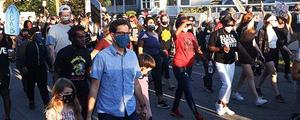PRINCETON, NJ -- The vast majority of U.S. blacks and Hispanics have no preference when it comes to labels commonly used to describe their racial or ethnic group. Sixty-five percent of blacks say it doesn't matter to them whether they are called "African-American" or "black," and 70% of Hispanics say it doesn't matter to them whether they are referred to as "Latino" or "Hispanic."
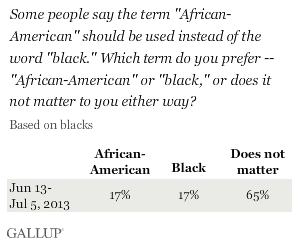
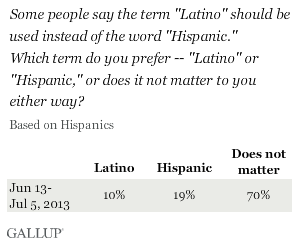
Blacks who do have a preference divide evenly between African-American and black. Hispanics who have a preference show a stronger proclivity toward the "Hispanic" label.
The results are based on Gallup's Minority Rights and Relations poll, conducted June 13-July 5, including interviews with 1,010 blacks and 1,000 Hispanics.
Majorities of all key subgroups of blacks say it doesn't matter whether they are called black or African-American. Although certain subgroups tilt in the direction of preferring "African-American" to "black," or vice versa, these differences are not large enough to be statistically meaningful.
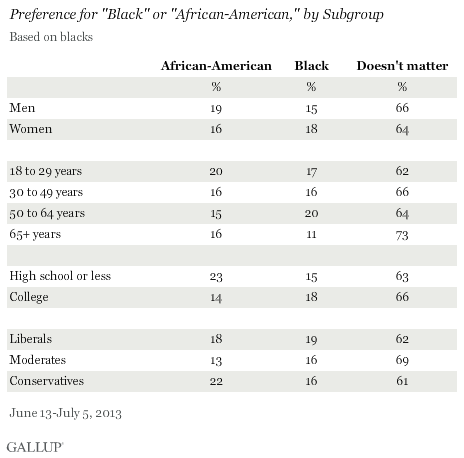
Similarly, majorities of all key Hispanic subgroups say it doesn't matter how people refer to their ethnic group, although older Hispanics are less likely to say this. Fifty-three percent of Hispanics aged 65 and older say the label people use to describe them doesn't matter, with 33% of this group preferring to be called Hispanic and 14% Latino.
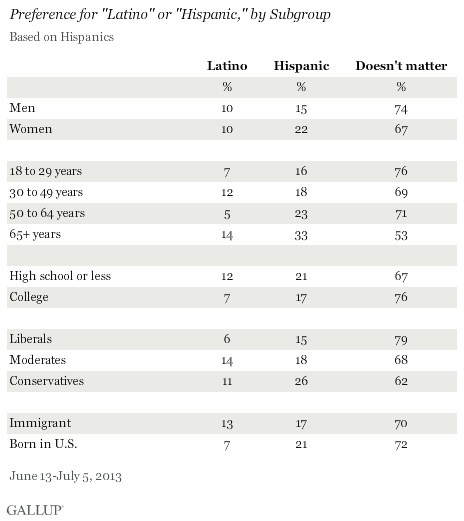
Blacks Have Consistently Not Preferred "Black" or "African-American"
Gallup has asked the "African-American" or "black" preference question of black respondents eight times since 1991. Each time, majorities of between 56% and 66% of blacks have said it doesn't matter to them which term is used. The preferences of those who do say it matters have been mixed over the years. In some cases, as in the current poll, about as many prefer to be called "black" as "African-American." In other cases, including the three polls prior to the current one, slightly more expressed a preference to be called "African-American" than "black."
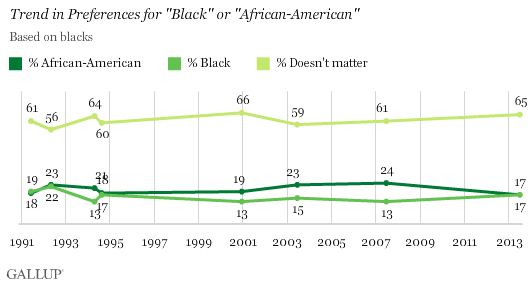
This is the first time Gallup has asked the question of Hispanics in this format. A different question, asked in 2001, produced the same general finding. Although Hispanics initially said they preferred being called "Hispanic" -- with no explicit "no difference" option offered -- on a follow-up question, the vast majority said it didn't bother or offend them if they were called "Latino."
Implications
Over time, cultural norms change and some labels commonly used to describe a group fall out of favor. In the 1930s through 1971, Gallup typically used the term "Negro" when asking questions about blacks. In fact, a 1969 Gallup poll of blacks found "Negro" to be the most widely preferred term among blacks -- at 38%, compared with 19% for "black" and 10% for "Afro-American."
Since 1971, Gallup has used the term "black" when asking questions about U.S. blacks. Although "African-American" has become more commonly used to describe blacks in recent decades, the current data suggest it is not a label blacks prefer to be called.
The U.S. Hispanic population has grown rapidly and has risen to become the largest minority group in the United States, outnumbering blacks. Gallup did not ask a question about Hispanics as a group until 1980, and has referred to them exclusively as Hispanics in questions since then.
The data suggest the vast majority of blacks and Hispanics do not care how people refer to their racial or ethnic group, among the most common popular labels. However, labels can be very important in modern society, and Gallup will continue to track these types of preferences in the future, in order to help establish objective indicators of preferences, rather than assumptions based on informal or anecdotal evidence.
Survey Methods
Results for this Gallup poll are based on telephone interviews conducted June 13-July 5, 2013, with a random sample of 4,373 adults, aged 18 and older, living in all 50 U.S. states and the District of Columbia, including oversamples of black and Hispanic adults. The total sample is weighted to represent racial and ethnic groups proportionately to their share of the population. All respondents had previously been interviewed for the Gallup Daily tracking survey.
For results based on the total sample of national adults, one can say with 95% confidence that the margin of sampling error is ±2 percentage points.
For results based on the total sample of 1,010 non-Hispanic blacks, one can say with 95% confidence that the margin of sampling error is ±5 percentage points.
For results based on the total sample of 1,000 Hispanics, one can say with 95% confidence that the margin of sampling error is ±6 percentage points.
Interviews are conducted with respondents on landline telephones and cellular phones, with interviews conducted in Spanish for respondents who are primarily Spanish-speaking. Each sample of national adults includes a minimum quota of 50% cell phone respondents and 50% landline respondents, with additional minimum quotas by region. Landline and cell phone numbers are selected using random digit dial methods. Landline respondents are chosen at random within each household on the basis of which member had the most recent birthday.
Samples are weighted to correct for unequal selection probability, nonresponse, and double coverage of landline and cell users in the two sampling frames. They are also weighted to match the national demographics of gender, age, race, Hispanic ethnicity, education, region, population density, and phone status (cellphone only/landline only/both, and being cellphone mostly). Demographic weighting targets are based on the March 2012 Current Population Survey figures for the aged 18 and older U.S. population. Phone status targets are based on the July-December 2011 National Health Interview Survey. Population density targets are based on the 2010 census. All reported margins of sampling error include the computed design effects for weighting.
In addition to sampling error, question wording and practical difficulties in conducting surveys can introduce error or bias into the findings of public opinion polls.
View methodology, full question results, and trend data.
For more details on Gallup's polling methodology, visit www.gallup.com.
